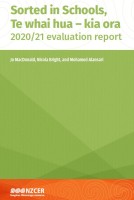Hello from Jane
If life taught us anything in 2020, it was that things change in sudden and dramatic ways. Beyond that, it reinforced the idea that you never know what is going to happen.
On the flipside it means good things come from change. And that is what 2021 has been for us.

Despite one very long lockdown, we’ve been flat out, working on ways to help New Zealanders retire with confidence, from launching the National Strategy for Financial Capability, to running Money Week, to launching our first workplace money skills for women course through our Sorted at Work programme. And we kept going, continuing to lift the financial capability of our tāmariki, by launching further teaching resources to kura and schools: secondary students will now be able to add credits toward their NCEA merit and excellence endorsements by learning about money.
Right now, we’ve partnered with four other agencies to develop a Safer Spending campaign – encouraging New Zealanders to reach out for help and learn safer ways to spend in the run up to Christmas.
Recently I was asked about the Massey’s research that said you need $809,000 to retire. Of course, that’s not entirely true, but it’s an effective provocation. There are multiple factors at play here depending on your lifestyle choices, but it was good to drive home the message not to panic and the importance of future planning.
As the international border closures continued, my attention turned to the calls for help from pensioners stranded in Australia and further afield. With no way of getting home, or securing an MIQ spot in time, they were facing having their NZ Super stopped, in some cases with repayment demands of 26 weeks. This is because longstanding policy states if you travel abroad for longer than 26 weeks your pension payments usually stop.
As I’ve said before, this may be a policy fair in ordinary times, but one that could not envisage the extraordinary cards Delta has dealt, nor the long closure of international borders. I was concerned the system was neither flexible nor fair. Common sense prevailed, with MSD agreeing to take a pragmatic approach for those caught out by the mid-year trans-Tasman bubble closure, but those stranded further afield, or who travelled earlier, are still encountering barriers. This has led me to question the lack of flexibility in our pension system that did not stop to think that COVID and MIQ and closed borders might deserve some kinder policy thinking. And which seems to penalise pensioners whose eligibility includes a period living or working abroad in their earlier years.
This probably sums up 2021. What has worked in the past may not be fit for purpose in the future. Retirement policy is no different. It needs to flex and move with the times.
This is what our next Review of Retirement Income Policies (RRIP) will focus on (see below). A lot has happened since the 2019 RRIP, including decumulation being a subject of increasing interest, and this will be one of the areas of focus for the 2022 RRIP. I was impressed by the recent work of the Retirement Income Interest Group of the New Zealand Society of Actuaries: their report, How to make drawdown a success shines a clear light on this, along with making a case for New Zealand Superannuation to be retained as a strong foundation.
Another interest area that will be informing RRIP recommendations is the lens we’ll apply to what retirement looks like for Māori. This is critical to presenting a balanced perspective: retirement policy cannot be a one-size-fits all approach and we need to ensure diverse thinking is embedded in policy making.
With the RRIP 2022 terms of reference set (they will be on our website soon), we are ready to kick into the task ahead. We’ll be undertaking a wide range of research and seeking feedback on key retirement issues over the coming months.
With COVID delays affecting Audit NZ, we’ve decided to release a preliminary 2020/2021 Annual Report, without the financial statements, as an online placeholder, so that its information isn’t entirely obsolete before publication! The full annual report with audited financial statements will be released next year as soon the audit and approval process is complete.
To conclude this eventful year, I would like to take this opportunity to thank my team and all our partners and stakeholders for their support. Together, our collaboration has brought us closer to our goal of helping New Zealanders retire with confidence.
And my personal thanks to those of who have helped and advised me in 2021. You know who you are. I still have much to learn but am privileged to work in a space that helps and encourages New Zealanders to flourish.
I wish you all a happy and safe holiday season. Meri Kirihimete
Ngā mihi.
Jane Wrightson
Mana Ahungarua / Retirement Commissioner
National Strategy for Financial Capability
2022 National Strategy Partners Conference
We’re excited to announce our first National Strategy Partners Conference will take place in Wellington’s Wharewaka Function Centre in May 2022. We have a great line up of guest speakers and there will be time to collaborate on topical issues and catch up with friends and colleagues from across the sector. All National Strategy partners will be emailed a formal invitation and registration details will follow early in the new year.
Glossary Project
Work has continued developing an industry-wide glossary, with the next online session due to be held on 15 December.
The glossary project is a key plank of the National Strategy’s Consistent Content goal, aiming to develop a consistent language across financial services to help New Zealanders understand money.
The theme of the upcoming session is on banking and lending terms, and representatives from a range of banks and lenders will attend to collaborate on this important project.
More National Strategy Webinars coming in 2022
We’ve been delighted with the positive feedback about our regular webinars showcasing key issues, latest research, and new initiatives. Thank you to all our presenters for their time and contribution to these especially during the COVID Level 4 & 3 lockdown. It was great to share these insights, so we’re pleased to announce that like any Hollywood blockbuster, we’ll be back for Season 2 next year with a range of topics we know you’ll enjoy. If you haven’t been attending the webinars and would like to, contact Rachel Beckett at rachel@retirement.govt.nz
Policy and Research
Review of Retirement Income Policies

Work is set to get underway on the 2022 Review of Retirement Income Policy (RRIP). By law we are required to carry out this review every three years and our report responds to the terms of reference issued by the Minister of Commerce and Consumer Affairs. The Retirement Commissioner will submit a report in December 2022 which will identify emerging issues for future work and provide recommendations to government.
A range of research will take place in the first half of the year to delve deeper into the three broad areas identified in the terms of reference, relating to New Zealand Superannuation, private savings (including KiwiSaver) and housing. As part of the review process, we will be engaging with various stakeholders with interests in retirement income policies. Insights will be gathered from existing research from here and internationally, utilising a mix of qualitative and quantitative research, including hosting various hui, focus groups with older New Zealanders and online surveys.
For more information about the Review of Retirement Income Policies and to see previous review reports, please visit our website or contact our Policy Director, Dr Suzy Morrissey at suzy@retirement.govt.nz
What does retirement look like for Māori?

At Te Ara Ahunga Ora we have a project dedicated to exploring that question. Led by Dr Kathie Irwin, the project is already gathering information and kōrero on what is known, where there are gaps and where our work can add value. Our draft rautaki/Māori strategy will be ready for feedback soon and Dr Irwin will open the kōrero on this with a webinar in February. The three hui that we had to postpone this year due to COVID, are back on the calendar for 2022. These will be run in Northland, Wellington and Christchurch in March so to register, please click here. For those who cannot make the hui, we have just published an online panui/survey with the same focus questions we will ask at the hui. Please note, the survey is only for people who identify as Māori and age 18 or over. The survey closes on 28 February – we look forward to hearing your feedback.
What’s new on Sorted.org.nz
Safer Spending campaign warns Kiwis of the perils of Buy Now Pay Later

The impact on people facing hardship due to the ongoing lockdown has financial support agencies banding together to drive home the message - spend safely in the lead up to Christmas.
National Strategy for Financial Capability partners Ngā Tāngata Microfinance, Good Shepherd NZ, Christians Against Poverty (CAP), FinCap and Te Ara Ahunga Ora Retirement Commission’s Sorted want to make sure those who need some extra financial help and advice know where to turn to.
The campaign promoting the services available of each of the agencies, along with safer ways to shop to avoid a ‘#buynowpainlater’ situation, kicked off just before the Black Friday sales and Christmas.
Early results show that financial assistance agencies are seeing increases in referrals from some of the advertising and Sorted has seen a significant spike in activity since the campaign launched.
Read our media release and see our Safer Spending campaign page for more information.
Credit Contracts and Consumer Finance Act changes come into force
It’s great news that borrowing has just got safer here in New Zealand. Thanks to recent rule changes, the chance of getting into crippling debt will be lower now that standards of lenders have been raised which will better protect consumers. Our latest blog, Here’s what the new lending rules mean for you, highlight what consumers need to know as borrowing money is not the same as its used to be.
My Money Sorted: Vaun

Schools
Glowing report card for Schools
More teachers and kaiako are signing up and using our Te whai hua – kia ora, Sorted in Schools programme and best of all they like it! In a recent independent evaluation from New Zealand Council for Educational Research, they rated the implementation and early outcomes of the programme as very good. This was based on key criteria being developing and sustaining a credible research-based programme, engaging with schools and kura, building financial literacy and capability, and enabling positive behaviour change.
The programme has grown rapidly since it was launched in 2019. Back then, 35% of schools and kura were registered. Now after three years, the programme can proudly claim that 76% of schools and kura are signed up. A great achievement given that financial literacy is not a core subject in the curriculum as Nick Thompson, Director of Financial Capability pointed out recently in The Spinoff last month.
Tax resources coming soon for English Medium Education
Created in partnership with New Zealand’s Inland Revenue Department, Te whai hua – kia ora, Sorted in Schools will be launching soon taxation resources for Years 9-10. The resources are made of six topics which serve as an introduction to how taxation works in Aotearoa New Zealand. The content within the topics aid students in the journey in getting “tax ready” through understanding taxes, why we pay taxes and how taxes are used, while simultaneously reinforcing basic maths and reading comprehension skills. Māori Medium Education tax resources are planned for roll out next year.
Money Jam is back for 2022

Back for its third year and to celebrate Global Money Week (21–27 March), Te whai hua – kia ora, Sorted in Schools will be running its successful Money Jam budgeting competition once again. The competition will encourage students to create a plan and budget to support a local community initiative and submit their idea for the chance to win. There are four major prizes of $2500 up for grabs to bring the four winning ideas to life. To find out more head to the Money Jam page for details.
Sorted in Communities
Te Puni Kōkiri is providing up to $100,000 in funding towards the train-the-trainer facilitator workshops, online refresher sessions, quality assurance oversight visits and resources. The project team are currently planning the next phase of workshops and oversight visits to roll out from February 2022 onwards.
Following the success of a pilot programme in Māngere earlier this year, discussions have recommenced with Kāinga Ora to start planning further home ownership and financial capability information sessions and workshops.
Retirement Villages
Retirement Villages Residents Association ramps up the call for urgent review of the legislation
The Retirement Villages Residents Association presented a petition last month calling on the Government to get the urgent review of the Retirement Villages Act underway.
Earlier this year we released a report and recommendations following public consultation on a discussion paper studying the effects of the complex legal framework governing the retirement village sector. In it we called for a review of the 20-year-old legislative framework to assess whether the balance of power between operator and consumer is appropriate.
A full legislative review has not taken place since the legislation was enacted almost two decades ago. The industry has grown in scope and complexity since then and projections are for further significant growth.
The review of the legislation is currently with the Ministry of Housing and Urban Development, which will lead this work. We are pleased that Hon Poto Williams, Associate Minister of Housing (Public Housing), has agreed that a review is needed and announced the Government will begin this work later this Parliamentary term.
Next complaint data report due out before Christmas
As part of our monitoring function under the Retirement Villages Act, we collect complaints data from operators of all registered retirement villages twice a year. Submissions for the last six-month period have now closed and we are preparing a summary report that will be published before Christmas.
The purpose of these reports is to help us identify trends and any concerns or issues in the industry and to inform the minister. They do not identify any of the complainants or villages involved. For previous reports click here.
Key dates
21 – 27 March 2022
Money Jam – schools and kura budgeting competition
January 2022
Review of Retirement Income Policies begins
May 2022
National Strategy Partners Conference
8-15 August
Sorted Money Week

